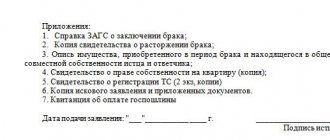When family life develops according to ideal canons, like: “they lived happily ever after and died on the same day,” jointly acquired property is a source of wealth and joy in the family. If life together does not work out and the spouses get divorced, it becomes a curse.
While separating cups, spoons and other movable belongings is still relatively easy, when it comes to real estate, people are simply stumped.
How to divide something that at first glance seems indivisible? An apartment? Dacha? House? The section of a private house in which a family permanently lives raises especially many questions. They pour in literally as if from a cornucopia:
- How to understand who is entitled to what share?
- Are spouses' shares always equal?
- What if the house was inherited by one of the spouses?
- What if it was registered in the name of one of the spouses, and the other spouse was involved in the construction and arrangement, or both together?
- What to do if, in addition to the husband and wife, children live in the residential property?
- What if one of the children is disabled?
- Is it possible to divide not only the monetary equivalent of the house, but also the premises itself, in fact?
- What methods of division exist?
And these are not all the questions that arise. In this article we will try to most fully illuminate the problem of dividing a private home during a divorce from a legal and practical point of view.
Home ownership
Russian civil legislation contains the concept of joint ownership. Family is a specific concept of common family members, in particular spouses. As for the husband and wife, everything that each of them buys or acquires during the marriage (except for inheritance and property received as a gift, but more on that below) is included in the joint property of the spouses.
At the same time, the termination of a marriage does not in itself become the reason for the termination of the fact of joint ownership of property. For example, after a divorce, the house still remains shared. And it will remain so for an indefinite time until it is divided legally.
That is, spouses can still reach mutual agreement and jointly dispose of the common house, or make a fair division, and then each dispose of their share (part).
ATTENTION! Joint property of spouses does not apply to children! That is, a house that belongs to the parents does not belong to the children (unless it was purchased or built with the participation of maternal capital).
This issue is regulated by Article No. 60 (clause 4) of the RF IC, and children are not subjects of the division of family property, regardless of whether the parents divide it due to divorce or just like that (according to the legal norms of the Russian Federation, spouses can divide property among themselves, without dissolving the marriage).
Community property in a marriage does not mean that either spouse cannot have personal property. For example, property donated by spouses to each other or to some third party is considered the personal property of the recipient of the gift and is not subject to division. The same applies to inheritance received under a will or line of succession. As well as property that the husband or wife owned before marriage.
Although, when it comes to home, there may be options. For example, before marriage, the wife had a plot of land with a dilapidated “barn”. During his family life, the husband, investing his earned money and personal labor, contributed to turning it into a comfortable estate. Such a house may be classified as joint property because the value of the property has increased significantly during the marriage. Such issues are resolved in court.
What is a deed of gift for an apartment
Real estate, including an apartment, can be received as a gift, and not just by officially endorsing it on paper. In other words, such an agreement is called a deed of gift in jurisprudence. For this purpose, it is necessary to contact a notary and draw up a donation document in accordance with the regulations of Article 574 of the Civil Code of the Russian Federation. The main difference between a gift agreement and a purchase and sale agreement is that the transaction is gratuitous and the inability of other persons to claim a share in the donated property, even if the donor’s heirs appear. The recipient can take ownership immediately after signing the document by the donor or upon the occurrence of specific events. At the same time, neither one nor the other party to the deed of gift pays anything to each other. And what is most important is that an apartment donated by law is personal property and is not shared with anyone.
Most often, close relatives - parents, grandparents, siblings - resort to this type of transaction. If the donor is a close relative, then you do not need to pay tax for the donated apartment to the state treasury, if there is no sale of the apartment in the first 3 years, otherwise the transaction will be considered profitable, and the Tax Inspectorate will oblige you to pay income tax. And if the donor is another person, then the recipient of the property will have to pay income tax in the amount of 13% of the appraised value of the apartment or 30% for non-residents.
Ways to divide a house. Agreements or court
Like most issues regulated by the RF IC, the problem of dividing a private house can be solved in two ways:
- Agree privately among yourself and draw up an appropriate notarial agreement that will have full legal force
- Draw up a statement of claim and allow the court to resolve insurmountable differences between spouses, based on legislative norms and rules
Let's look at both methods in a little more detail.
Agreement
The husband and wife independently determine the shares that each of them receives in the event of a divorce. According to the rules, they should be equal. However, spouses can also agree on unequal shares, taking into account, for example, children.
Although from the point of view of the law, children do not have the right to parental property, the law does not prohibit parents from taking their interests into account privately.
For example, a spouse leaving the family may transfer his share to the children in lieu of monthly alimony payments. Or leave the spouse, with whom the children live, a larger share in the house. Simply put, by agreement, spouses can agree on any method of dividing the house, or reimbursement of part of its value by the one who will continue to live in it.
This method is convenient and preferable in the sense that the internal affairs of a family (even if broken up) remain its internal affairs and do not require the intervention of government bodies. But it can only be applied when the conflict between divorcing spouses has not reached the “extreme boiling point” and people are still able to communicate constructively with each other.
Court
If the husband and wife cannot agree or suspect that the other party “wants to deceive them,” they will have to resort to the help of the court. One of the home owners, or both together, can sue. In this case, a joint statement is written.
It is better to submit an application to the territorial court at the location of the house (especially if it is joint). If one of the spouses files a lawsuit, he can do so at the place of residence of the other (the defendant).
Dividing a house does not have to happen at the same time as the divorce process. You can do this in advance, or, conversely, after the divorce. You have the right to choose a mode that is convenient for yourself, and you should do so.
For example, if the divorce is complex and is accompanied by several claims for alimony, the place of residence of children, and the order of meetings with them, it is better not to complicate the already complicated process with an additional claim, but to postpone the section “for later.” If there are no particular disagreements, it would be optimal to “sue” at one time, so as not to repeat the entire unpleasant procedure again.
How does the partition happen?
If at least one of the above grounds for dividing a donated apartment is met, then the issue can be resolved in one of the following ways: peacefully or through the court.
Out of court
If the divorce is not associated with difficulties, and the spouses do not have minor children, then the marriage can be dissolved through the registry office, without resorting to the courts. However, it is important to discuss the issue of division of property in advance. If it can be resolved peacefully, and the spouses can agree among themselves legally or fairly on the division of the donated property, taking into account all the nuances: the presence of children, free living space, the financial situation of each party, as well as participation in increasing the cost of the apartment, then the court can to avoid.
Of course, today most married couples, having resolved the issue peacefully, do not record all the agreements on paper during a divorce. Which is the biggest mistake. Now you are dividing the donated property, and after a while the second spouse may change his mind and return his apartment. And most importantly, the law is on his side. Therefore, it is better to immediately go to a notary and record everything in a document that will have legal force. The agreement can stipulate not only the division of gifted property, but also jointly acquired property. If the terms of the agreement are violated, the second spouse may go to court.
In a court
If the divorce is carried out through the court, then at the meeting, as a claim, the issue of dividing the donated apartment can be raised. You can also claim real estate rights by filing a separate statement of claim that will relate exclusively to this issue. However, it makes sense to resolve this through the courts if the above conditions are met. At the court hearing, both parties are heard; there must be compelling reasons and evidence that it is necessary to classify the property of one of the spouses as jointly acquired property. Additionally, you can involve witnesses: neighbors, colleagues, friends. If there are plenty of arguments and there is a clear violation of the interests of one of the parties, then during a divorce the property is divided in half or in established shares.
I would like to point out right away that the chances of winning such a case are very small. The judge rarely accommodates the plaintiff, since the law clearly states that a donated apartment during a divorce cannot be divided, just like any other property that is classified as personal. But there may be exceptions, and most often they relate to situations where spouses with children lived in a donated house or apartment, and after a divorce, the spouse and children are left without living space. In this case, the judge can protect the interests of minor children and make amendments, for example, allowing them to live in this apartment with their mother until they reach adulthood or assigning a part of the real estate to them.
The issue of division of property always remains one of the most controversial in judicial practice, and each time can be decided taking into account the individual characteristics of a particular family. It is very difficult to achieve a positive decision and appropriate a share of donated property. However, if you take up this matter, then it is best not just to seek advice from a lawyer, but also to represent your interests in court as a lawyer in order to successfully resolve the issue.
Statute of limitations
According to the provisions of Article No. 38 (clause 7) of the RF IC, spouses are given three years to divide the common property among themselves. But this figure should not be taken unambiguously as a three-year period from the date of divorce.
Article No. 200 (clause 1) of the Civil Code of the Russian Federation explains that the period of validity of a claim is considered not from the moment of the occurrence of the event giving the right to file a claim, but from the moment the plaintiff becomes aware that his rights (in this case to common property) have been violated . Let's explain this with a real example.
The concept of deed of gift and the nuances of registration
There are no difficulties in the issue of donating an apartment after a divorce and dividing it if you accurately understand the concepts. Real estate can be presented as a gift to a relative or a stranger in general. The document for the donated property can be drawn up in person or you can seek help from a lawyer. The second option is preferable, since a specialist knows the intricacies of the law and will help to avoid mistakes and inaccuracies. And this will eliminate the possibility of problems arising with how the gifted real estate is divided after the dissolution of the union and how to establish the very fact of receiving property as a gift.
Example from judicial practice 2021
Citizen A was married to citizen B for 12 years. During this time, the couple built a house. After the divorce, B remained living in the house, which A did not object to. She did not renounce the right to joint property, but simply went to live elsewhere.
He lived in a house with a new family and had two children. 8 years later B died. The inheritance (actually, this house) was to be divided among his new wife, mother and two sons.
However, A filed a lawsuit to restore her rights to half of the house as property acquired jointly during the marriage. The defendants (heirs B) insisted that the statute of limitations had expired, since 8 years had passed since the divorce.
The case was considered in turn in three instances. The territorial court satisfied A’s claim, the appeal sided with the defendants, and the Supreme Court, where the cassation appeal was filed, confirmed the correctness of the first instance and citizen A.
It was recognized that before the event preceding the claim (the transfer of the house by inheritance as the sole property of B), citizen A had no reason to believe that her ownership rights to half of the house, which belonged to her on the basis of joint ownership with B, were violated.
Therefore, the statute of limitations has not expired and the claim must be allowed because A did not declare her waiver of title in favor of B.
This precedent confirms the position of the Supreme Court regarding the statute of limitations regarding the division of joint property after divorce. From a legal point of view, material assets belonging to spouses in a marriage can be divided at any time.
As for the practical side of the matter, then, perhaps, it is more reasonable to deal with the division of property after a divorce in the “foreseeable future”, without postponing this issue for many years.
After separating, each spouse begins to build his own life independently. New people appear in it, new families are created. You can, of course, “get yours back” after 20 years, but then be prepared to face grueling legal proceedings and difficulties in getting your share in the house that once belonged to your family.
How to properly formalize a donation
A gift agreement is drawn up in writing with the participation of two persons - the donor and the donee, or their legal representatives or representatives by proxy. Both parties to the transaction sign at the end of the document. Mandatory notarization of the contract is not required, but it will never be superfluous.
The following cannot be donors:
- persons recognized by the court as legally incompetent and their legal representatives,
- children under fourteen years of age and their legal representatives.
Donees who will not be able to register rights to a gift if they received it from their clients and their relatives:
- civil servants,
- employees of medical and educational institutions,
- social service workers.
If a common apartment (or part of it) is donated by one of the spouses, then the second must give his written consent to this. The same is required from parents if the gift is made by their minor children. In the case where a parent gives housing to their child, the consent of the second parent is not required, even if their housing is shared.
When a part of an apartment divided into several shares is given as a gift, it is necessary to obtain mandatory consent from the remaining shareholders.
It is not difficult to draw up a gift agreement with a good sample in hand. But it still needs to be registered with Rosreestr, for which it is necessary to collect an impressive package of documents. And this needs to be done immediately. After the death of the donor or other unforeseen situations, it will no longer be possible to register the fact of the gift. In this case, the transaction will no longer be considered completed.
Documents for registration of a gift agreement for an apartment:
- identity passports of the donor and the donee,
- property donation agreement,
- document on ownership of the apartment,
- cadastral passport with apartment plan,
- BTI certificate about the cost of the apartment,
- certificate of persons registered in the apartment,
- notarized consent of the spouse (if the ownership of the apartment is joint, except for donation to children),
- consent of all homeowners (if a share in the apartment is given),
- consent of the legal representative or guardian (if the donee or donor is incapacitated or a minor),
- power of attorney (if the interests of one or the other party are represented by a third party).
Only if all these conditions are met will the gift agreement be considered valid and the question will not arise whether the donated apartment is divided in the event of a divorce.
Similar nuances apply to the division of inheritance during a divorce. Indeed, in this case, general funds were not used for its acquisition either.
Contents of the statement of claim
The requirements for statements of claim are more or less the same for all types of claims: business style, absence of errors and blots in the test, compliance with the general form of business documentation (“header”, title, main part, date and signature at the end). Writing method - handwritten or printed (previously documents were printed on a typewriter, now this can be done using a computer). All this is recorded in detail in Article No. 131 of the Code of Civil Procedure of the Russian Federation.
The application must indicate:
- Full and exact name of the court, plus sometimes the name of the judge
- Full names and addresses of the plaintiff and defendant (if the registration and actual addresses are different, both should be written)
- Cost of the claim (since the division of the house refers to property claims, and the fee for it is calculated depending on the price of the house, cadastral or market)
- Circumstances of the claim (data on marriage and divorce, data on the purchase of a house, the need for its division, additional information) with links to the attached documents
- Claim (to divide the house)
- Links to legislative norms giving rise to the claim
- List of attached documents, which must include: Copies of passports, marriage/divorce certificates
- Title documents for real estate (house) and documents confirming its value
- Duty payment receipt
And also (depending on availability and need)
- marriage contract
- separation agreement
- children's data
- and anything else that the court requires
A sample application can be found and downloaded on the Internet, or you can write it yourself with the help of a lawyer. All documents are submitted to the office in triplicate. After the case is accepted, the first meeting is scheduled a month later. Further, either the court makes a decision on division (it comes into force after another month, during which the defendant can challenge it), or schedules a new hearing if additional documents and evidence are required.
Step-by-step division of donated property in court
The defendant usually has to prove the donation if the donated item is included in the total estate to be divided.
In response, the other party may file a defense to the claim and request that the specific item be excluded from the list. The requirements are supported by evidence. What the procedure looks like:
- The initiator of the division files a claim in the district court if the value of the claims exceeds 50,000 rubles. In other cases, the proceedings are handled by magistrates.
- The defendant receives a copy of the application and a ruling to initiate proceedings, and finds out the date of the hearing.
- Before the first meeting, a response to the claim is submitted. It is reviewed by the judge, but this is also allowed throughout the entire process until a court decision is made.
- The judge makes a ruling to satisfy the objection; the plaintiff has the right to file a counter-objection, but if there is evidence of donation on the part of the defendant, it will not be satisfied.
- Based on the results of the proceedings, a reasoned decision is made.
The exclusion of a gift from the dividing estate is permitted not only by filing an objection to the claim, but also by filing a counterclaim from the defendant. In both cases, the case is considered within the same proceeding.
Challenging interim court rulings is not allowed. Parties may appeal the final decision within 30 days of the decision.
Evidence of donation
The collection of evidence is entrusted to the party requesting the exclusion of gifts from the dividing estate. The following may serve as confirmation of the fact of donation:
- deed of gift;
- testimony of the donor;
- checks and receipts from the donor confirming the expenditure of own funds.
The main document is the gift agreement. Additionally, you may need an appraisal report confirming that there is no increase in the value of the donated property.
Is it possible to divide a house after a divorce?
In this context, we are not talking about allocating shares in property to spouses, but about the actual division of living space in accordance with these shares. That is, whether it is possible for the former spouses to continue to live in the same house, but no longer “under one roof,” but each in their own half, independent in fact and legally.
Yes, in some cases this is possible, but only a forensic construction examination can give a final answer.
Expertise
The actual division of the house is possible only if the requirements of housing standards and the functional purpose of the premises are met. That is, it depends on the size and layout of the house. The conclusions of the examination may be of a recommendatory nature regarding possible redevelopment. The examination may offer several options for the division or come to the conclusion that it is impossible.
For example, it is impossible to divide a house with stove heating if the stove is only in one half, and it is impossible to install a second analogue. It is impossible to divide a house into floors if it is not possible to provide an independent entrance to the floor. You cannot give the wife the kitchen, and the husband the living room and bathroom. It is impossible to divide a small house if after the division the area of each part is less than the required living space standards. And so on.
How to divide a house after divorce?
If, from a technical point of view, the house can be divided into two equal, independent parts, the court decides to divide it into shares and allocates these shares in kind.
If division is possible, but the size of one independent part is smaller in area and does not correspond in size to the legal share, the court may decide on division in kind and monetary compensation. That is, the co-owner for whom the actual share turned out to be greater will pay a certain amount to the one whose share is less.
If actual division is impossible in principle, there may be a variety of alternative solutions (it is important that it suits both parties):
- Sell the house and divide the proceeds according to shares
- Transfer the house to one of the co-owners and require the second to buy out the second’s share
- Continue to share the house, establishing an order that does not violate the rights of either party
But in any case, judicial division is carried out on the principle of fairness and equality of marital shares.
In judicial practice, there are cases when an unfinished house is divided. If it structurally allows for actual partitioning (with minimal or even no design changes), then it actually divides. If not, it is subject to division by alternative means. The price of such a house includes the price of materials needed to complete construction.
Share size
By default, marital shares are equal unless other proportions of division are stated in the marriage contract or agreement. But, of course, in practice there are exceptions.
For example, the court may allocate a larger share to the spouse who has minor children in his care. Especially if the child is disabled group I or II. Or reduce the share of one of the spouses if the second proves that he did not invest funds in the family budget, but, on the contrary, brought losses to the family.
This rule cannot be applied to a woman who gave birth and raised children without working. Also, physical inability to work (long-term illness, disability) is considered a valid reason that allows one of the spouses not to work and at the same time have an equal right to joint property.
Also, before proceeding with the division of joint property (including a house), the court allocates that part of the property that is considered personal (purchased before marriage, gifted, inherited). It doesn't share. The rest is divided into shares. If possible, the court establishes the order of the actual division (what exactly will go to whom).
If the house was purchased with maternity capital funds
This is a very special case. Such a house is not considered the joint property of the spouses, but the joint property of the entire family, including children. Consequently, it will not be divided into two, but into everyone. If a house is purchased or built using maternal capital, each child must have their own share in it.
ATTENTION! No housing transactions in which a share belongs to minor children are possible without the involvement of guardianship and trusteeship authorities. Including the conclusion of a voluntary agreement on the division of property or judicial division after a divorce.
The guardianship authorities check whether the child’s rights are respected and give their consent or do not give consent. In case of judicial division, the opinion of the guardianship authority can be taken into account when requesting that the spouse with whom the children remain live have a larger share in the house.
If there are children
The presence of children in most cases does not affect the order of division of property after a divorce. The financial rights of the child are protected by assigning alimony, but family property is a completely different matter. It belongs to the parents, and children have no right to claim it.
But the RF IC allows an increase in the share of the spouse, with whom the children remain after the divorce, in real estate (we are talking about a house). If the plaintiff intends to exercise this right, then it is important to draw the court’s attention to the presence of children. This should be specifically mentioned in the claim, or a separate petition should be filed.
Most likely, the share of the parent who remains with several minor children or with a disabled child will be increased. This should also be reflected in the claim.
Is the child's property divided?
Minor children also have the right to own personal property. Computers, musical instruments, and expensive high-tech toys belonging to children are not subject to division. Moreover, even if the house in which the family lives is received by the child as an inheritance from another relative, or given as a gift, it will also not be divided between the parents.
Property belonging to the child is transferred to the parent with whom he will live. In this case, the second parent is not entitled to any compensation.
ATTENTION! It is important to list all property belonging to the child in the statement of claim. This will save you from disputes and the need to prove this fact in court.
Conditions of the marriage contract
The division of jointly acquired property, as well as personal property at the discretion of the spouses, will be allowed by a marriage contract, which must be concluded before the purchase of movable or immovable property. It can stipulate any conditions for the division of property, however, without prejudice to the interests of each of the parties. The apartment can be divided either in half or in accordance with certain shares. Such a transaction between spouses is absolutely legal, the main thing is that the marriage contract is drawn up in accordance with all the rules. Such a document will take precedence over the provisions in the Family Code (Article 40 of the RF IC).
Division of property if there are minor children
Judicial practice of dividing a house when there is a child
Firstly, the presence of a minor child who lives with him gives the plaintiff the right to choose the court authority. A claim can be filed not only at the location of the house or the place of registration of the defendant, but also at your place of residence.
Secondly, judges quite often increase the share in the house for a parent of several children or one who cares for a disabled child.
ATTENTION! Any sale of real estate in which children live and are registered is possible only with the permission of the guardianship and trusteeship authorities. When parents, when dividing property, decide to sell the house and divide the money among themselves, a representative of the guardianship must be present at the court hearing. The court itself will call him. But in some cases, it is reasonable to inform the guardianship authorities in advance about the planned event, convince them that the child’s rights will be respected, and obtain permission to sell the house. It should be attached to the statement of claim, then the process will go faster.
If you still have questions regarding the division of a house after a divorce, the qualified lawyers of the Prav.io portal will be happy to answer them.
Presence of minor children
Is an apartment divided if minor children are registered in it? If a married couple and their children live in an apartment that is the property of one of the spouses, according to the deed of gift, then what will happen in the event of a divorce? This question depends on who the children stay with after the divorce, and whether they have free living space to live. If the property where the family lived belongs to the husband, and after the divorce the minor children remain with their mother and have nowhere to live, then the court takes into account the interests of the minor children. And since the mother is the legal representative of the children, she lives with them in this apartment until they reach adulthood.






